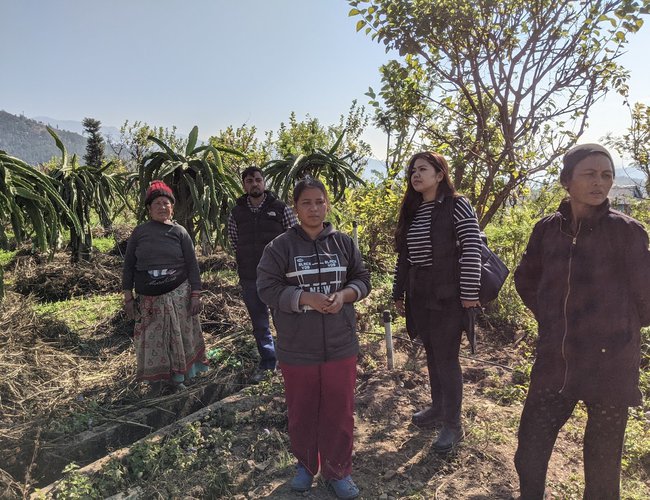
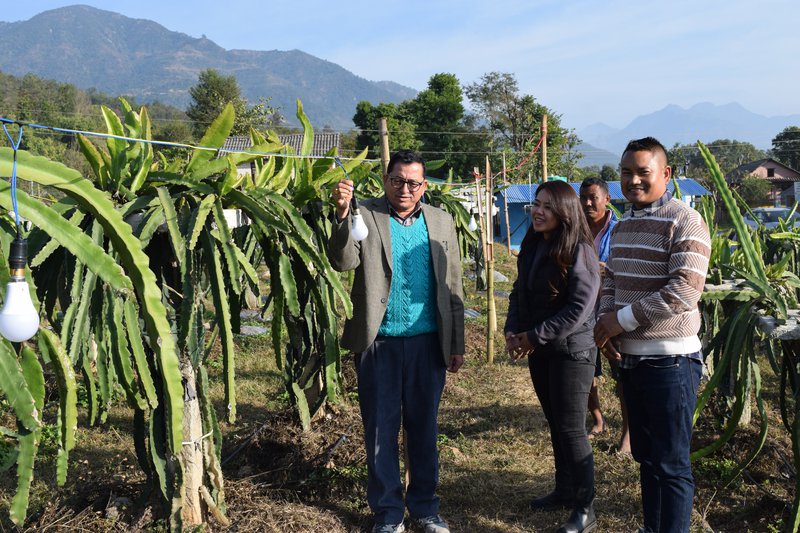
Chetan BK from Lekbeshi Municipality in Surkhet district of Karnali Province dedicates most of his time to tending his dragon fruit plants. BK, a former Indian army dropout and aspiring foreign worker, began cultivating dragon fruit after attending a training jointly organized by Helvetas and local Small Farmer Agriculture Cooperative, Satakhani of Lekbeshi Municipality Ward no 9 Surkhet District.
Eventually, with the close collaboration of local Small Agriculture Cooperatives, Helvetas Nepal's InElam project provided BK with financial and technical assistance to grow his dragon fruit.
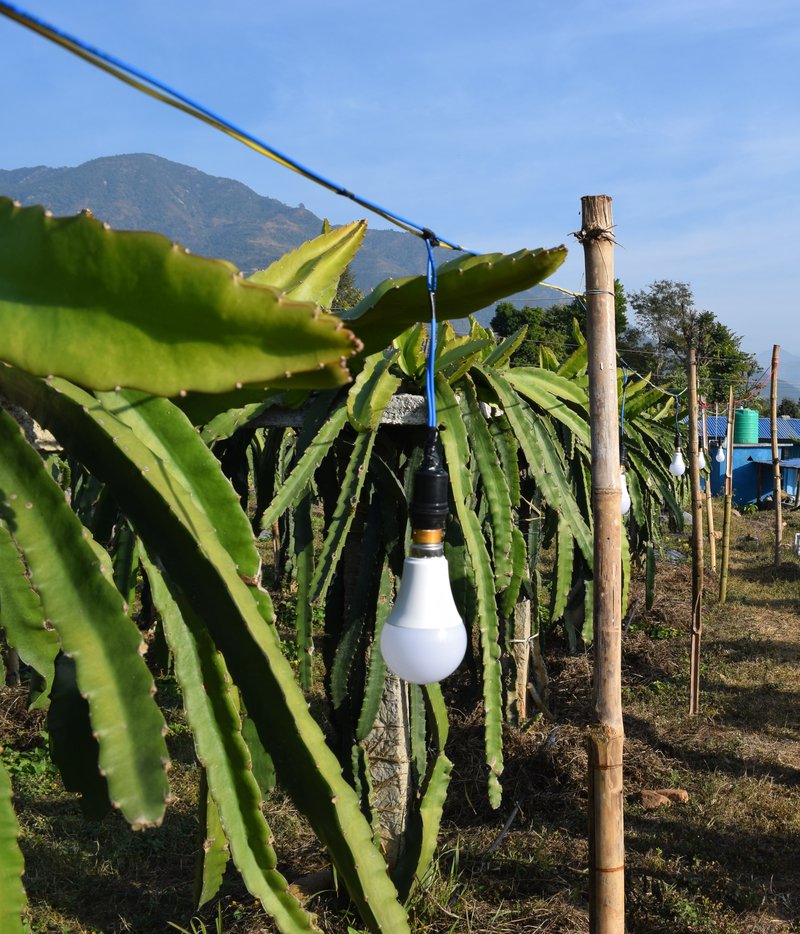
His brother, who has a degree in agriculture, previously worked in an agricultural office where he was introduced to a dragon fruit farm, is his big asset. Upon consulting with his brother, he started the farm planting dragon plants.
With the help of their entire family, the two brothers began with 250 plants on three ropanis of land two years ago. To secure a loan, BK's grandmother agreed to use her land as collateral to local cooperative.
In the first harvest, it was not much but they earned more than Rs. 400,000 in second year. BK said that they produced more than 3 tons of dragon fruit. Initially, they were skeptical about the new crop and the market. However, after seeing its attractive returns, they decided to add more plants. This year, they plan to add another 300 plants.
BK claims that the yield from growing dragon fruit is four times greater than the yield from growing cereal grains. The local market and surrounding markets, like as Surkhet and Kohalpur, are where the fruits are sold.
Chetan BK's wife, Sangita BK, said that the dragon stopped her husband from taking a job abroad in Malaysia. She stated that her spouse is earning more money at home than he is when he travels.
BK fixed Rs 500 per kg for the white kind of dragon fruit and Rs 700 per kg for the red variety last year. Seventy percent of the loan with interest has already been paid by BK's Subhakamana Agriculture and Animal Firm Private Limited, which was financed by Small Farmer Agriculture Cooperatives Ltd Satakhani of Lekbeshi Municipality ward no 9 Surkhet.
The manager of Small Farmer Agriculture Cooperatives Ltd, Hari Prasad Paudel, stated that other farmers are requesting loans to plant dragon fruit in response to BK's success.
To cultivate the fruit, the farmer must erect a pillar for every four plants to provide support. The plants grow vines on which they bear fruit. Each plant can produce up to 30 fruits per season and begins yielding fruit within a year of being planted.
According to Tek Bahadur Singh of Helvetas Nepal, this is one of the most successful initiatives of InElam in terms of improving the livelihoods of poor and marginalized communities.
They have recently had their first harvest and are optimistic about good production in the second lot as well. Several local farmers in the municipality have planted over 3,500 exotic fruit plants, including both white and red varieties of dragon fruit.
Due to good market connections and high demand, dragon fruit farmers are earning four times more than they usually earn from traditional crops. According to Akriti Rana from Helvetas Nepal, the cash crop is also discouraging people from seeking employment abroad.
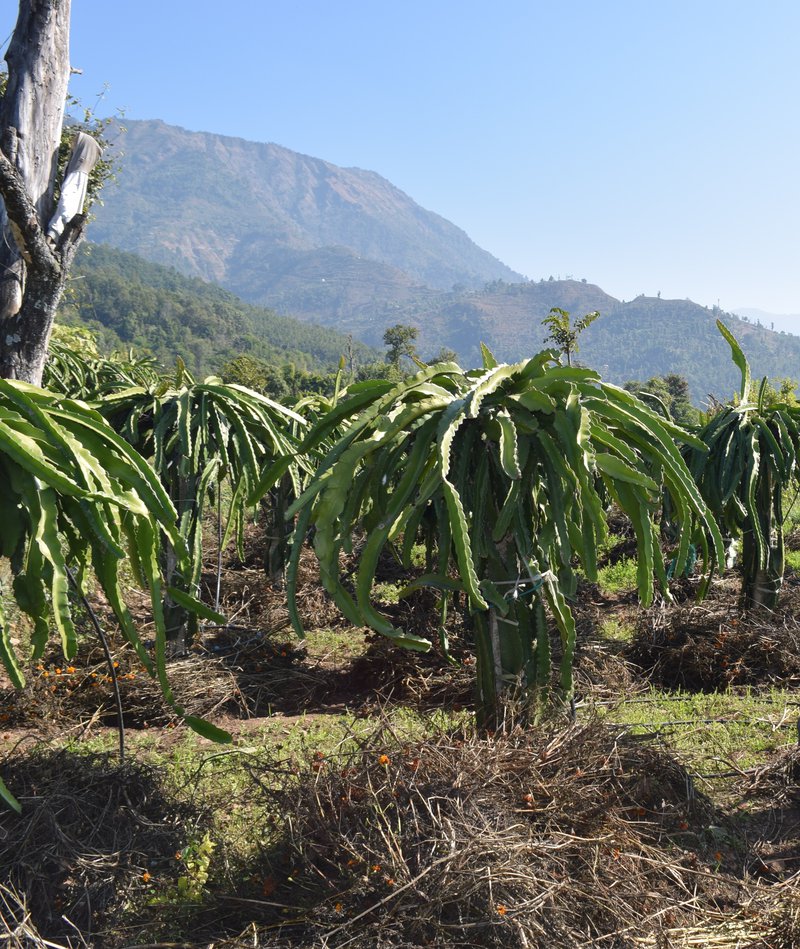
Dragon fruit farming has become popular among farmers, with the white variety growing and yielding fruits faster than the red variety, although the latter fetches a higher price in the market. Most farmers have learned how to cultivate dragon fruit through online resources.
They report having no difficulty selling their fruits. Raskoti stated that the villagers were initially surprised by the new fruit variety. However, after tasting it, they began to purchase it.
The local government is currently offering production-based subsidies to farmers to encourage the cultivation of exotic fruits such as dragon fruit, according to Hari Prasad Poudel, the manager of the local cooperative.
.According to Hari Gurung, team leader of the InElam Project, dragon fruit is easier to sell in department stores and fruit shops due to its novelty and attractiveness to buyers.
Dragon fruit is a cactus species that originates from Mexico and grows in hot and dry areas. It has a sweet and sour taste.
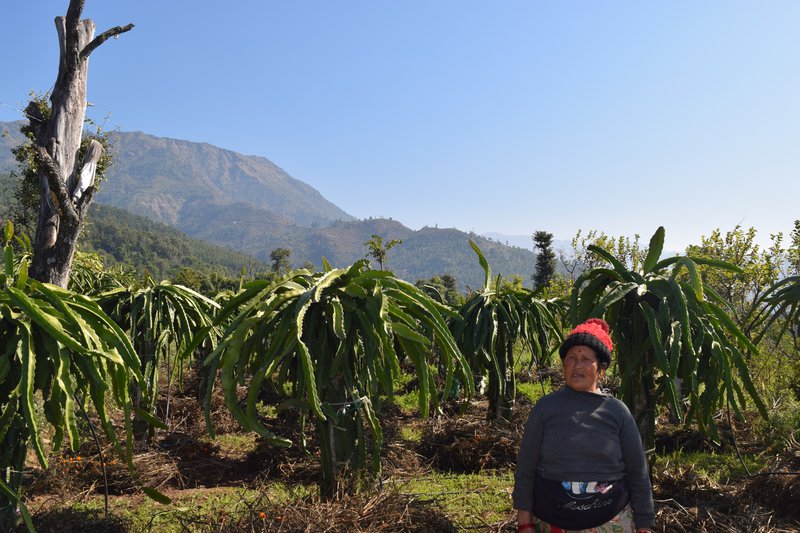
Farming this fruit can provide self-employment opportunities for the unemployed and help alleviate the unemployment problem to some extent. Acquiring skills in cultivating Dragon Fruit can lead to employment opportunities. Developing an interest in Dragon Fruit may inspire readers to promote its cultivation. Dragon Fruit is renowned for its distinct taste and nutritional and medicinal benefits. This fruit has great potential in the Nepalese context.
Pioneering farmer Hira Bahadur Gharti also served as the chair of the Dragon Association Surkhet. With Helvetas' assistance, his Karnali Dragon Fruit Firm sells more over Rs. 3 million worth of dragons every year. Regular inspection trips are also conducted by his farm and nursery to the province's farmers.
Nepal is a country with a strong agricultura sector, with numerous productive fields and a majority of the population depending on it for their livelihood. However, there is a need for a drastic change in agricultural practices to improve the economic and socio-political standards of the people.
"A part of Helvetas Nepal's mission is to promote cash crops by distributing necessary technology and providing other assistance, such as advocacy." "This is a way to transform the livelihoods of marginalized and economically backward people in rural Nepal," said Dr. Prabin Manandhar, Helvetas Nepal's country director. "InElam project has been implementing various programs in this regard in collaboration with various stakeholders."
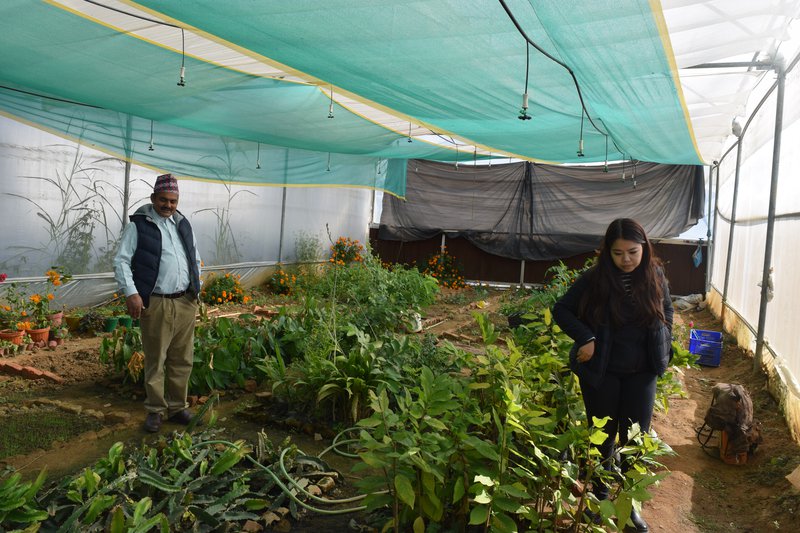
The sector faces many pressing issues. Changes should be made in a manner that provides a sense of security to each farmer in their occupation. To ensure improvement in the agriculture sector, it is crucial to coordinate with the relevant authorities to address the existing problems.
Dragon fruit is proof that a commercial crop can significantly improve farmers' lives. A nation can attain economic development in the agriculture sector by enacting policies that give priority to native products, facilitate market access, and discourage the importation of goods. Support for Dragon Fruit from Helvetas Nepal is important here.
- Indian Power Minister Khattar Inspects Arun-III Project, Inauguration Of Koshi Corridor Postponed
- Apr 22, 2025
- US Reciprocal Tariff Is Likely To Be Limited: Experts
- Apr 22, 2025
- Nepal’s Snow Leopard Population Reached 397
- Apr 22, 2025
- Education Minister Bhattarai resigns from post
- Apr 22, 2025
- Foreign Minister Dr. Deuba Chaired Asia-Pacific region confronting
- Apr 21, 2025















